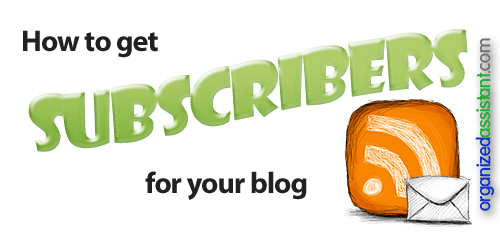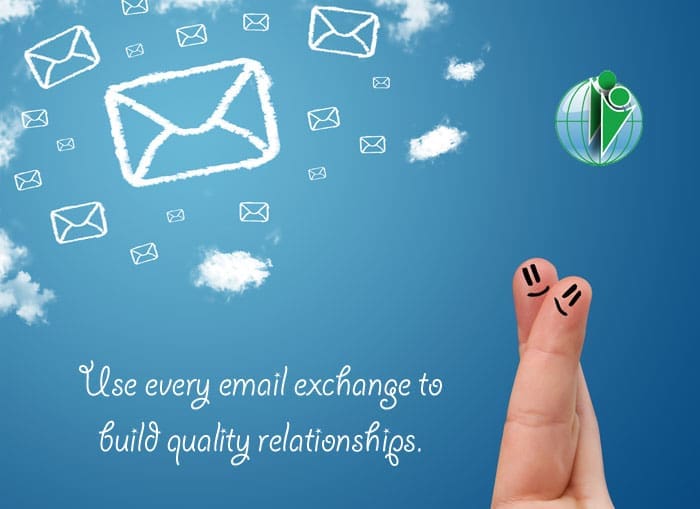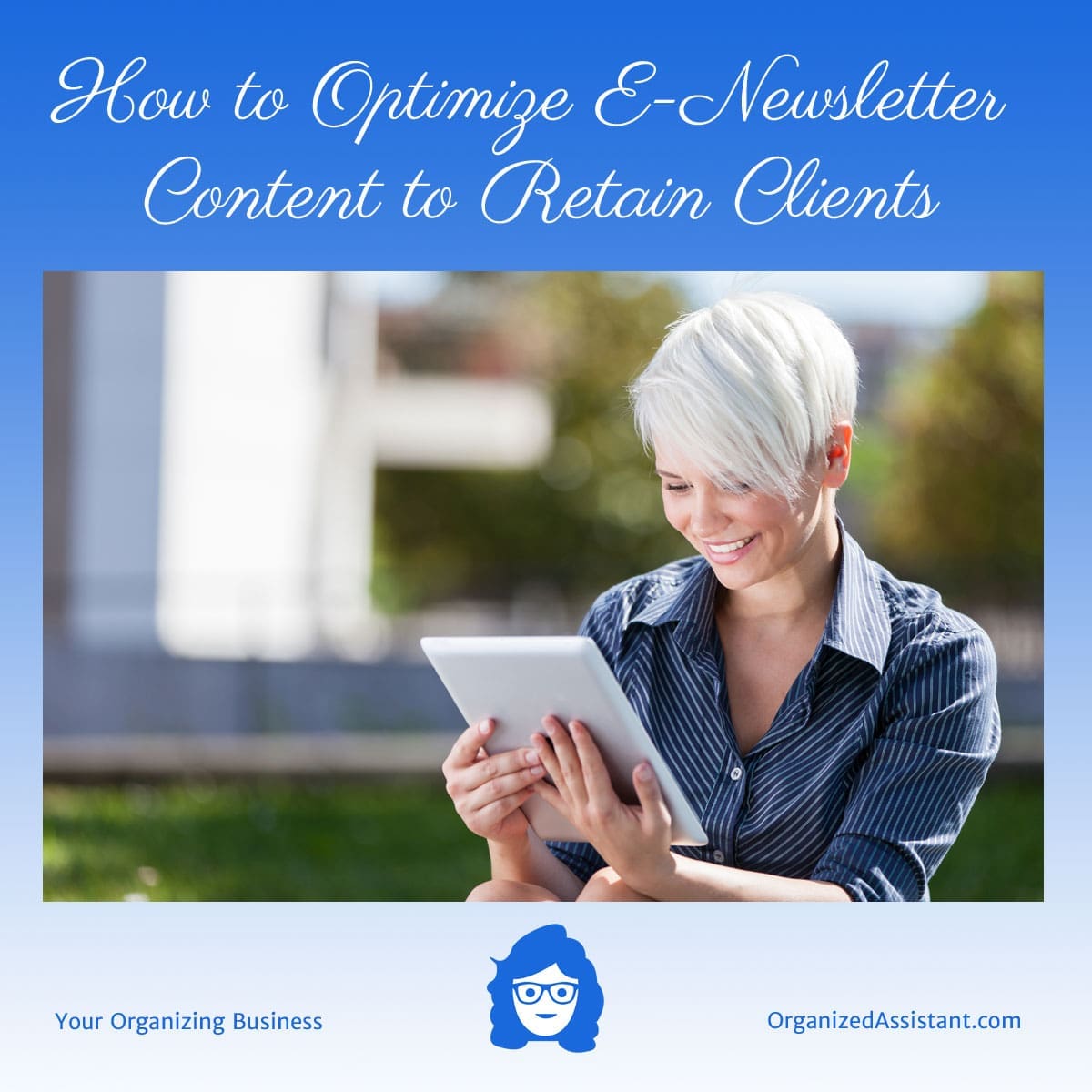How to get subscribers for your blog
This page may contain links to Amazon.com or other sites from which I may receive commission on purchases you make after clicking on such links. Read my full Disclosure Policy

Once you’ve attracted traffic to your blog and encouraged those new visitors to stick around, you need to convert them into subscribers, so they’ll continue reading your blog on a regular basis. Today I’m going to explain how to get subscribers for your blog.
When it comes to blog subscriptions, there are two basic options: email and RSS. You will want to offer both, so your readers can choose how they’d like to subscribe. Although it’s better for you to have your blog posts going right into your subscribers’ inboxes, some people prefer RSS, and an RSS subscriber is a lot better than no subscriber!
RSS Subscriptions
An RSS feed from your blog is essentially a running list of your latest posts. Readers can choose from various RSS readers, including Microsoft Outlook, Feedly, and many others.
Most blogging platforms have an RSS feed built right in, and you should have an RSS feed button prominently displayed on your site so readers can easily add your blog to their RSS reader. If you’re not sure how to set this up, ask your web person to do it for you.
By the way, if you were wondering, RSS is an acronym for Really Simple Syndication or Rich Site Summary, depending on who you ask.
Simple Email Subscription Services
You can enable email subscriptions by using either the Jetpack plugin for WordPress or FeedBurner. Although free and relatively easy to set up, there are several drawbacks.
- You can’t control the schedule. Every time you post to your blog, an email goes out. If you blog several times a week, your readers may feel they’re getting too many emails and unsubscribe.
- There are rumors afloat that Google may discontinue FeedBurner. I’m sure this won’t happen overnight, but keep in mind that if you use FeedBurner, you may need to transition to another service at some point down the road.
- The only way to email your subscribers is to post something to your blog, so you have no way of offering a free gift as an incentive to new subscribers or to send out special “subscriber-only” offers.
Email Marketing Platforms
You’re therefore better off using a service like MailChimp.
When you set up an RSS-to-email campaign, you choose when it goes out. If you blog infrequently, you can set up a daily schedule, so it goes out as soon as possible after your post is published. If you have no new content, no email goes out. If you blog more regularly, you might find that a weekly or monthly schedule works best.
Every new post you publish since the last email will be included, making it into a very simple newsletter. To see how this looks, feel free to subscribe to Your Organizing Business using the sign-up form at the bottom of this page.
Because your mailing list isn’t directly connected to your blog, as it is with Jetpack and FeedBurner, you can offer a free gift as an incentive to new subscribers, and set MailChimp up to automatically send them the download link once they’ve confirmed their subscription.
You also have the ability to send messages other than those generated through your blog, though you must make it very clear when people sign up that you intend to do that. Otherwise, they might flag you as a spammer – and rightfully so!
Lastly, you can customize your email template to match your website, which is so important for branding!
If you’re wondering what all this is going to cost you, you’re in for a pleasant surprise – MailChimp is a free service, as long as you have fewer than 2000 subscribers and don’t mind including their logo in the footer of your messages. Otherwise, you can pay a monthly fee based on your list size, and access a number of additional features.
Your Subscription Form
For maximum exposure, your subscription form should appear prominently “above the fold” on every page of your blog. If it looks too cluttered, put the form on its own landing page and put an eye-catching link to it throughout your site.
There’s actually a lot to be said for putting the subscription form on its own page. For one thing, it’s much easier to direct people to it in an email or when you’re speaking, and will therefore be more effective than sending them to your home page and hoping they can find the form.
A landing page works especially well if you offer a free gift to new subscribers, because you have lots of space for describing the offer without cluttering up your blog pages.
One more thing…
Sometimes I see widgets on blogs that show the number of subscribers, but think hard before you do this. You might be excited to have 98 subscribers, but it’s not likely to impress anyone else.
Did you know?
I specialize in working with WordPress and MailChimp! Contact me today to get started.




Thank you for all of the information Janet! Building a website and business is certainly challenging to say the least. I never thought about landscaping my page, and although I currently have a dedicated page for my special offers, your suggestion is a great option to save space. Also, your advise on having an email template to match your website is very important, I agree.
I’m glad it’s helpful to you, Shannon! Definitely don’t worry about implementing everything right away – a website is always a work in progress!
I’ve been lazy on doing this. I assume I have RSS through WordPress, but I’ve never done anything to promote it. I guess this is something to add to our list:)
Yes, your RSS feed is automatically built in, so adding a button would be a very small job.
I’m a fan of Feedly. It’s very usable and was able to add the different blogs to it. It also allows me to easily share with Tailwind, Pinterest, Facebook, and Twitter without having to open a browser and reshare.
That’s brilliant! I have a Feedly account but haven’t been using it lately. I need to take better advantage of it!
I’ve been using MailChimp for two years now for my monthly newsletter and really like it. Very user friendly!
Do you use it to automatically send out your blog posts, a regular newsletter, or both?